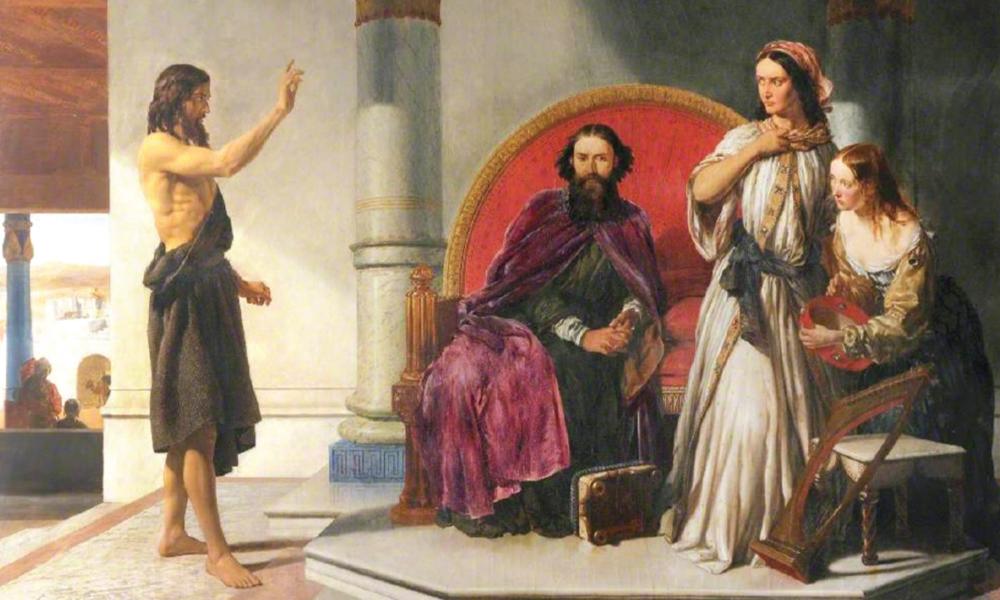
A lesson from Herod: Pause and Listen
The martyrdom of St. John the Baptist — beheaded by Herod Antipas after he was arrested for proclaiming Herod’s marriage unlawful — is worth praying through for many reasons. It’s an inspiration to proclaim the truth despite the consequences. It’s a reminder of John the Baptist’s faithfulness to his cousin Jesus, the Christ whom he first recognized in the womb of Mary.
The martyrdom of St. John the Baptist — beheaded by Herod Antipas after he was arrested for proclaiming Herod’s marriage unlawful — is worth praying through for many reasons. It’s an inspiration to proclaim the truth despite the consequences. It’s a reminder of John the Baptist’s faithfulness to his cousin Jesus, the Christ whom he first recognized in the womb of Mary.
A homily I heard a few years ago pointed out something I had never considered: the martyrdom of St. John the Baptist is a lesson in peer pressure. As a refresher — Herod had St. John arrested due to his wife, Herodias, being furious with John’s proclamation to the tetrarch, “It is not lawful for you to have your brother’s wife” (Mk 6:18). The Gospel recounts that Herod kept John in prison and “when he heard him speak he was very much perplexed, yet he liked to listen to him” (Mk 6:20).
When Herodias’ daughter performed a dance at a birthday banquet Herod hosts for himself, he promises her anything she wants, and in front of all his guests, which included “his courtiers, his military officers, and the leading men of Galilee” (Mk 6:21). Seizing her chance, Herodias advises her daughter to ask for the head of John the Baptist. Herod is described as “deeply distressed, but because of his oaths and the guests he did not wish to break his word to her” (Mk 6:26). So he orders St. John beheaded.
I remember the homilist asking, “What do you do because others are watching?” While I’ve never had anyone beheaded, some of the dumbest things I’ve done or failed to do were due to who was watching. There are times that I failed to speak up and times I spoke without thinking first. Moments when I looked the other way when I encountered someone in need, and other times I allowed myself to be entertained by stories of others’ distress (my “reality TV watch party” phase). There are plenty of moments in my past that I’m not proud of, many occurring due to what I thought others were thinking about me — just like Herod at his party.
I definitely cannot speak to exactly what Herod was thinking, but I’ve learned that when we feel put on the spot, we may experience the mammalian “fight, flight or freeze” reaction that can cause us to do or say the first thing that will relieve the temporary social discomfort — even though it might not be the best option.
As parents, we often tell our kiddos “do the right thing.” However, a second nugget to send with them into the world is: “You always have a choice.” My son’s speech therapist, an expert on how sometimes our brain is slow to give us the right words, encourages her clients that whenever they’re asked a question to first take a deep breath and say, “I’m thinking,” while tapping their chin. Then, they can take as much time as they need to come up with the right words.
Whether it’s announcing, “I’m thinking,” taking a deep breath or even excusing ourselves for fresh air, both kids and adults can benefit from having a strategy to pause, collect our thoughts and say a prayer. We always have a choice. Practicing a pause to listen to and recall what God wants for us can prevent us from acting impulsively and un-Christ-like.
Alison Blanchet lives in Panama City with her husband and three children. She works as a therapist for children and teens. Email her at alisondblanchet@gmail.com.



